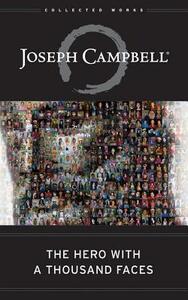Take a photo of a barcode or cover
Fascinating. Too academic for a pleasure-read, but it definitely made me think about all the things—specifically, faith & storytelling.
Ahh Finally finished reading this book! It helped me greatly during this semester!
This book was recommended to me as a writing craft book, for it’s extensive walkthrough of the “Hero’s Journey” that is seen so universally within the mythologies of nearly all cultures.
I'm going to recommend people skip these first 37 pages--as it's mostly a hyper-intellectual, nigh sycophantic ode to Freud and Jung's psychological theories (especially regarding dream interpretation—with a notable fixation on the so-called Oedipus Complex.) Not at all what I was expecting! There are continual examples/references made to the supposedly significant dreams of unnamed people. Which, unfortunately, dates the book—as Freud’s theories have since been largely debunked.
When it comes to dreams, I’m in Ebenezer Scrooge’s corner:

Some of these myths and/or historically significant stories included are quite interesting... Many I’ll admit I’ve never encountered before, and was happy to learn about. But I consistently found myself wondering at the author’s personal interpretation of their meaning/morals, especially since relevant experts aren't cited. So, I had to assume this is purely his opinion he's so authoritatively foisting upon us. The effect is that of shoe-horned “evidence” supporting his claims. (Not unlike those aforementioned Freudian dream interpretations.)
There was also a certain subtle undercurrent of disrespect toward a number of exiting religions—an insistence on referring to their texts as myth, along with interpretive explanation to certain stories I suspect few adherents would actually agree with. (The exception being a more positive tone shift when the religions of India were presented.)
On the whole, it was an awful lot of textbook-styled tedium to pick through in search of the storyteller formula. Too much bias and overreach for me to recommend, outside of its lesser-known mythology tidbits.
P.S. Don’t expect the imagery to correspond with the text it’s been situated in the middle of.
I'm going to recommend people skip these first 37 pages--as it's mostly a hyper-intellectual, nigh sycophantic ode to Freud and Jung's psychological theories (especially regarding dream interpretation—with a notable fixation on the so-called Oedipus Complex.) Not at all what I was expecting! There are continual examples/references made to the supposedly significant dreams of unnamed people. Which, unfortunately, dates the book—as Freud’s theories have since been largely debunked.
When it comes to dreams, I’m in Ebenezer Scrooge’s corner:

Some of these myths and/or historically significant stories included are quite interesting... Many I’ll admit I’ve never encountered before, and was happy to learn about. But I consistently found myself wondering at the author’s personal interpretation of their meaning/morals, especially since relevant experts aren't cited. So, I had to assume this is purely his opinion he's so authoritatively foisting upon us. The effect is that of shoe-horned “evidence” supporting his claims. (Not unlike those aforementioned Freudian dream interpretations.)
There was also a certain subtle undercurrent of disrespect toward a number of exiting religions—an insistence on referring to their texts as myth, along with interpretive explanation to certain stories I suspect few adherents would actually agree with. (The exception being a more positive tone shift when the religions of India were presented.)
On the whole, it was an awful lot of textbook-styled tedium to pick through in search of the storyteller formula. Too much bias and overreach for me to recommend, outside of its lesser-known mythology tidbits.
P.S. Don’t expect the imagery to correspond with the text it’s been situated in the middle of.
bu kitabı değerlendirebileceğimi düşünemiyorum çünkü devam edemeyip yarım bıraktım, belki ileride bir kez daha şans verebilirim
Ehhhhhh... i think the derivative works are probably more useful to a writer, and it's telling that Campbell is not at all discussed in modern folklore & mythology academia (as far as i can tell).
This is one of those books that's been mentioned and referenced by others so many times that I thought it would be worth checking out the source itself. Turns out, I think I like the excerpts others have used in other materials better. The book is certainly comprehensive in its analysis of the hero's journey, but that also lends a very dry, almost textbook-like quality that makes it a bit of a slog to read through. There's no question that Joseph Campbell has a wealth of knowledge on the topic, but I found myself getting bored by the frequent and extensive passages cited as examples. Overall, it was an interesting read, but all of the really useful information I gleaned from it is information I've previously found in leaner, more focused summaries.
I did enjoy a lot of the stories and examples of myths given but it made the book feel very disjointed- like a shallow recounting of a million stories with very little payoff or analysis, jumping from point to point. The demonstration of his breadth of knowledge on mythology made it feel like he was showing off how well read he was rather than saying anything with real meaning. I don’t even want to say he was reaching for points because he didn’t really say anything substantial. I felt like this book rambled on forever- I had high hopes but was so relieved when I finally finished it. There were interesting parts but I just don’t think the messages of the book were groundbreaking at all.
A classic, mandatory reading for psychologists, theologians, ones who study mythology and seek to bust through outdated patterns that no longer serve humanity.
The Hero With A Thousand Faces by Joseph Campbell is a mythological bible that's older than you think.
In the days of yore when the mere idea of the Internet was a pipe dream, and the secrets of the first computers were either lost to history or covered up by nervous post-war governments, one Joseph Campbell published his seminal work in 1949: The Hero with a Thousand Faces, a comparison of classical mythology that focused on the archetypal hero and his journey. In essence, he attempts to render these stories down to their familiar tropes, then demonstrates how these tropes originate from archetypes encoded within the human brain. The Hero's Journey is an archetypal story pattern common in ancient myths and modern-day adventures.
It can be boiled down to three stages:
* Departure: the Hero leaves the familiar world behind.
* Initiation: the Hero learns to navigate the unfamiliar world of adventure.
* Return: the Hero returns to the familiar world.
The work became a lot more well-known after George Lucas cited the work as a significant source of inspiration when writing the first six Star Wars movies. Since then, it has become a substantial source of media for anyone involved in creative writing careers, and its themes are commonly discussed in many literature courses. The book is incredibly fascinating with its use of mythology. This is what the phrase "hero with a thousand faces" describes, the idea being that all mythological heroes are facets or reflections of one heroic archetype.
In the days of yore when the mere idea of the Internet was a pipe dream, and the secrets of the first computers were either lost to history or covered up by nervous post-war governments, one Joseph Campbell published his seminal work in 1949: The Hero with a Thousand Faces, a comparison of classical mythology that focused on the archetypal hero and his journey. In essence, he attempts to render these stories down to their familiar tropes, then demonstrates how these tropes originate from archetypes encoded within the human brain. The Hero's Journey is an archetypal story pattern common in ancient myths and modern-day adventures.
It can be boiled down to three stages:
* Departure: the Hero leaves the familiar world behind.
* Initiation: the Hero learns to navigate the unfamiliar world of adventure.
* Return: the Hero returns to the familiar world.
The work became a lot more well-known after George Lucas cited the work as a significant source of inspiration when writing the first six Star Wars movies. Since then, it has become a substantial source of media for anyone involved in creative writing careers, and its themes are commonly discussed in many literature courses. The book is incredibly fascinating with its use of mythology. This is what the phrase "hero with a thousand faces" describes, the idea being that all mythological heroes are facets or reflections of one heroic archetype.



